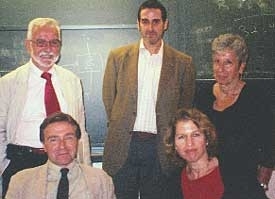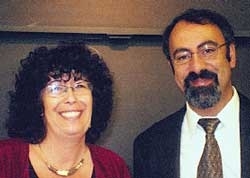Bulletin N° 248
Subject: ON SELF-DELUSIONS AND REAL CONSTRAINTS IN
TIME OF WAR
31 July 2006
Grenoble, France
Dear Colleagues and Friends of CEIMSA,
In these soul-searching times, when political mistakes of the past have
been brought home to haunt us, we come face to face with the total
inadequacies of our culture which inhibit us from confronting the
irrational constraints of late capitalism and militarism in any
meaningful way. In fact, our careful training has had just the opposite
effect of acquiring skills necessary to organize alienated citizens
around the collective self-interests, of learning how to communicate
beyond the barriers of class, ethnicity, and gender, of facilitating
discussions of new strategies that would include people as a
purpose,
and
not simply as some abstract means to an end.
We stand in shame, as accomplices to major war crimes committed by a
cynical political elite who have somehow found their way to the levers
of political, economic and military power. We hardly know how they
acquired access to this power, and we cannot fathom what they really
want, in any ontological sense; nor do we know to what extremes they
are willing go in order to arrive at their short-term goals. We do
sense, however, that the danger is real, that our future is threatened,
and that to stop this madness we must collectively find something
better.
If there is any lesson to be learned from the American political system
it is that supporting "the lesser evil" is
no solution. No one
has better depicted the pathos of the opportunistic mobilization of
hatred in
the absence of real democracy than George Orwell, in
his books
Animal Farm and later in
1984. When we are
not present and democratically participating at discussions of
strategy,
his message reads, we become easily manipulated at the lower level of
tactics,
and because of our
ignorance of the real context we
sometimes become convinced by arguments in favor of Kamikaze tactics,
or rather stumble into situations, like imperial troops, which offer no
alternative.
For George Orwell's description of the obligatory but effective "hate
sessions" in front of the larger-than-life image of Goldstein (1984)
visit :
Another literary warning shot was fired by the former African-American
slave Frederick Douglass, who later became a self-educated
abolitionists, and who wrote toward the end of his life :
- Find out just what people will
quietly submit to, and you have found out the exact measure of
- injustice and wrong which will
be imposed on them, and these will continue till they are resisted
- with either words or blows. The
limits of tyrants are prescribed by the endurance of those whom
- they oppress.
The following
7 articles pertaining to the repression most of
us feel to varying degrees were received by CEIMSA during the last
couple of days, when one atrocity after another was reported from the
Middle East.
Item
A. contain two current
articles sent to us by TruthOut, the first by
Tom Perry on
protestors who broke into UN Head Quarters in Beirut; the second by
Kathy Gannon describes the Israeli attack on civilians in the southern
Lebanese village of Qana, where 56 were killed this morning in their
sleep by Israeli-American missiles
.
Item
B. is an article from
Dhar
Jamail on the use of illegal weapons, including white phosphorus,
by Israeli Defense Forces against civilians in Lebanon.
Item
C., by
The Progressive
Magazine editor,
Matthew Rothschild is his comments on
Condoleezza Rice, "Midwife from Hell".
Item
D. is from Princeton's
Institute
for Advanced Study Professor
Joan Scott, who was the
keynote speaker at the Princeton Middle East Society conference where
on the agenda was a discussion of the current dangers to academic
freedom in United States universities.
Item
E. is an article sent to us
by
Richard Du Boff on "why no peace or stability can emerge in
West Asia through occupation, subjugation, and the military slaughter
of civilians," written by Siddharth Varadarajan,
Deputy Editor
of
The Hindu in New Delhi, India
Item
F. is a video interview from
Democracy
Now's Amy Goodman, showing Hezbollah Leader Hassan Nasrallah
talking with former U.S. diplomats on Israeli aggressions, prisoner
exchanges, and the founding of Hezbollah.
And, finally, item
G., by
Robert
Fisk, is a commentary on what he believes to be Blair's tactics of
using "ceasefires" as a weapon for political ends.
An additional item, providing more context for a better understanding
of the articles below, is this video report depicting the reality and
horror of today's war against civilians.
Sincerely,
Francis McCollum Feeley
Professor of American Studies/
Director of Research
Université Stendhal - Grenoble 3
http://dimension.ucsd.edu/CEIMSA-IN-EXILE/
______________
A.
from Tom Perry & Kathy Gannon :
30 July 2006
http://www.truthout.org
- Protestors
Break Into UN HQ in Beirut
- by Tom Perry
Beirut - Lebanese protesters broke
into the U.N. headquarters in Beirut on Sunday, smashing windows and
ransacking offices, after an Israeli air strike killed 54 people in
south Lebanon.
Several thousand people massed outside the building
in downtown Beirut chanting "Death to Israel, death to America. We
sacrifice our blood and souls for Lebanon".
Geir Petersen, the personal representative of U.N.
Secretary-General Kofi Annan in Lebanon, condemned the Israeli attack
on the village of Qana and called for an immediate investigation.
"I strongly condemn today's killing of tens of
civilians by Israeli shelling of residential buildings in the village
of Qana," he said. He was not in building when it was attacked.
By late afternoon, all the protesters had drifted
away.
At least 542 Lebanese, mostly civilians, have been
killed in the war between Israel and Hizbollah and there is growing
anger in Lebanon that the international community has not done enough
to end it.
Lebanon's health minister estimates the toll at 750,
including unrecovered bodies. Fifty one Israelis have also been killed.
"We understand the feeling of the Lebanese people
after many civilian victims fell in the bombardment of Qana ... which
reminds us of the tragedy that befell the people of the village in
1996," said Mervat Tallawy, U.N. under-secretary-general.
"We appreciate the intervention of the highest
Lebanese authorities to provide protection for the U.N. headquarters in
Beirut and Lebanon's need for the United Nations and ESCWA," said
Tallawy, the executive secretary of the United Nations Economic and
Social Commission for Western Asia (ESCWA).
In April 1996, Israeli shelling killed more than 100
civilians sheltering at a U.N. peacekeepers' base in Qana. On Sunday,
most of the 54 killed were children.
Calls to Attack Tel Aviv
U.N. spokesman Khaled Mansour said the building had
been stoned and furniture smashed but no U.N. staff were hurt as they
had taken refuge in the basement. He said a small fire was started on
the second floor but it had been contained.
Demonstrators held aloft the flags of Lebanon,
Hizbollah and the Amal party, whose leader, Parliament Speaker Nabih
Berri, appealed for a halt to the attack on the building.
Demonstrators tore down a U.N. flag outside the
building and ripped it to shreds and called on Hizbollah leader Sayyed
Hassan Nasrallah to launch rocket attacks on Tel Aviv.
"Oh Nasrallah, oh our cherished one, destroy,
destroy Tel Aviv," they chanted.
Members of Hizbollah, the Shi'ite group that sparked
the war 19 days ago when it seized two Israeli soldiers and killed
eight in a cross-border raid, tried to restrain the crowd.
Following the attack, Lebanon canceled a planned
visit by U.S. Secretary of State Condoleezza Rice on Sunday, saying she
was unwelcome until a ceasefire was declared.
-
- Go
to Original
- The Associated Press
- Sunday 30 July 2006


